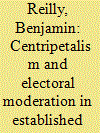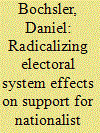| Srl | Item |
| 1 |
ID:
159908


|
|
|
|
|
| Summary/Abstract |
Centripetal approaches to ethnic conflict management seek to promote inter-ethnic accommodation and moderation by making politicians dependent on the electoral support of groups other than their own base. There is an ongoing debate about the utility of such approaches, including which kinds of electoral systems can best promote moderate and centrist politics in deeply divided societies. Neglected in this debate, however, has been the experience of ethnically diverse established democracies utilizing centripetal electoral models. This article examines historical evidence from Australia, and recent natural experiments with subnational electoral reform in the United States, which lend support to centripetal claims that preferential, “ranked choice” or “instant runoff” voting can encourage electoral moderation and address political polarization.
|
|
|
|
|
|
|
|
|
|
|
|
|
|
|
|
| 2 |
ID:
111491


|
|
|
|
|
| Publication |
2012.
|
| Summary/Abstract |
In order to bolster sustainable peace building in violently divided societies, a normative suggestion is that efforts should be made to construct a shared public identity that overarches ethnic divisions. A number of different centripetal/transformationist processes are identified as engineering a shared identity in comparison to consociational arrangements, which are accused of institutionalising ethnic differences and perpetuating conflict. These transformationist approaches essentially rest on the premise that because ethnicity is constructed it can be reconstructed into new, shared forms. Looking at Northern Ireland, we argue that there are limits to the extent that ethnicity can be reconstructed into shared identities. By analysing consociational and centripetalist/transformationist approaches to division, we conclude that although consociationalism will probably not deliver a common identity, it does provide a robust form of conflict regulation.
|
|
|
|
|
|
|
|
|
|
|
|
|
|
|
|
| 3 |
ID:
120356


|
|
|
|
|
| Publication |
2013.
|
| Summary/Abstract |
This paper investigates electoral outcomes produced by the two-round majority system in ethnically divided societies. Earlier studies, focused mainly on the Southern American states, have revealed that in ethnically mixed environments, competitors with radical positions on ethnic issues perform particularly well. This paper extends this idea to municipal elections in Serbia, showing how radical majority nationalist parties exhibit particularly strong performances in ethnically mixed municipalities. While this effect is also apparent under proportional representation, we argue that it is much stronger when a two-round majority vote system is employed.
|
|
|
|
|
|
|
|
|
|
|
|
|
|
|
|